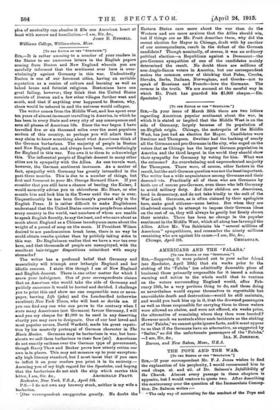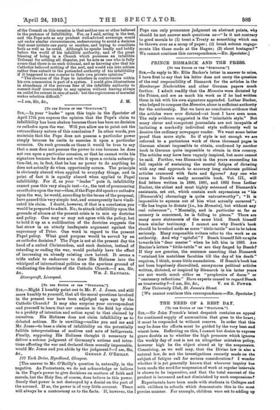THE POPE AND THE WAR,,
[To IBA Emma at WS ..erecrArna."] Smi,—If your correspondent Mr. F. J. Jones wishes to find the explanation of his perplexity, I would recommend him to read shape. xi. and xii. of Dr. Salmon's Infallibility of the Church. Almost every passage in those chapters is apposite, but I would vesture to quote two. After describing the controversy over the question of the Immaculate Concep- tion, Dr. Salmon writes
:- "The only way of accounting for the conduct of the Pope and
of the Council on this occasion is that neither one or other believed in the pretence of Infallibility. For, as I said, acting is the test, and the Pope acts as any prudent well-advised sovereign would act under similar circumstances, endeavouring to avoid a decision that must irritate one party or another, and trying to conciliate both as well as be could. Although he speaks loudly and boldly before the world of his infallible authority, and of the great blessing of being in a Church which possesses an infallible Tribunal for settling all disputes, yet he acts as one who is fully aware that there is no such tribunal, and as knowing also that his Catholics believed nothing of the sort, and would run into schism rather than submit to the pretended authority of his infallibility if it happened to ran counter to their own private opinions." "The slowness of the Pope to interfere in controversies within his own communion is part of a system. I could give illustrations in abundance of the nervous fear of the infallible authority to commit itself irrevocably to any opinion without leaving always an outlet for retreat in case of need: but the copiousness of material makes selection difficult."
—I am, Sir, Ac.,















































 Previous page
Previous page